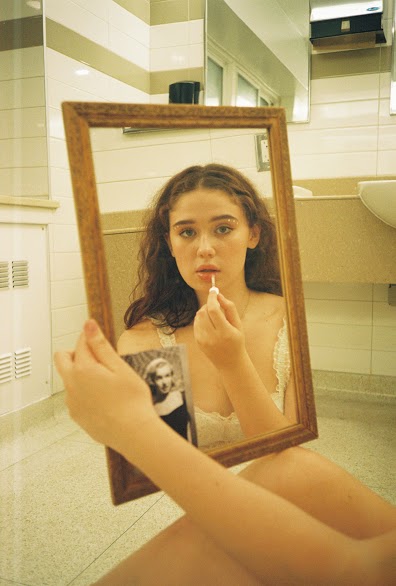Like many born on the cusp of the Millennial and Generation Z overlap, I spent most of my formative years on the internet.
I bided my time curating blogs, occupying fantasies like lonely planets. It was an amalgamation of Gossip Girl screengrabs and Lana Del Rey lyrics, tinged in the pink lens of The Virgin Suicides. I dreamt of a girlhood I could not and could never have. I yearned for romantic love and heartbreak like it was my birthright, though I had yet to experience both. Realistically, that was the least of my problems. But I knew – in time, those bright and burning impulses would dull into nothing – and they did. I abandoned the heart-shaped sunglasses and got to work. Until somehow, over a cool spring evening with Ginger Taylor’s Yuppie EP on loop, I was brought back to those days.

A conceptual EP, Yuppie interpolates recordings of mid to late twentieth century broadcasts, setting the stage for its subject: a turbulent rendezvous between a wealthy girl and an outsider. It’s a familiar story; Taylor cites Vladimir Nabokov’s Lolita as a direct inspiration. “Prologue” is the introduction to this tale, a collage of clips that recall an Americana transformed with time and change. “If I’m generally anything, I’m generally miserable,” a yearning, girlish voice says. Laughter drifts in and ends the track. Even under the static of her dated accent, her words are real. Taylor carries this atmosphere into the contemporary through the title track, which launches the narrative arc of Yuppie. The rich cool girls of my youth laid insults with a calm, dreamy allure; it’s no different with Taylor’s persona on this EP.
“Did you think that I would fall in love? / I don’t make time for people I’m bored of,” she pouts. Deep, booming synths oscillate around her voice, doubled in a way that smudges the edges of her vocal. Her efforts to detach are underlined with hesitance, as she and the outsider sneak around. The yuppie crumbles in the hands of her admirer and under the fear of getting caught by people in her world: “’Cuz unlike you / I have a lot to lose.”
“The rich cool girls of my youth laid insults with a calm, dreamy allure; it’s no different with Taylor’s persona on this EP.”
Reckless abandon follows, as told on the next track, “’99.” Stylistically similar to “Yuppie,” the two recall synth-pop hits of the early 2010s – glazed, mid-tempo anthems with a smattering of fizzy claps and drum fills. Fittingly, the tone shifts on “’99,” when the yuppie fully embraces the affair. “He’s not a phase or a hobby,” she sings. It’s a common line that signals immaturity, too young to realize the fleeting nature of her desire. I’d usually laugh along, guilty of the joke, but it’s hard not to take it seriously with how Taylor enunciates – delicate yet grasping.

Thinking back on those days online, I realize that the teenage fantasy I coveted wasn’t of a mature, romantic love, or any degree of love in its truest form. Rather, I saw love as a placeholder for personal growth – momentum – the ability to escape a desperate situation or submerge myself in one, coming back with new beauty and wisdom. The depravity that occurs in Lolita only ever got to take the backseat because of beautiful prose, similar to how I ignored the problematic parts of Gossip Girl and Lana Del Rey’s Born to Die to indulge in my own, real life desires.
“There’s no hazy, rose-colored filter to sugarcoat the hurt, no great heartbreak to triumph over.”
For the exact opposite reasons, “Seaside Arms” lands as Yuppie’s standout track. It grounds itself in even-tempered guitar, cooling you off like an overcast sky wisping crisp air off the shore. Taylor’s voice sways softly as she recounts the fallout of the affair and the feelings that come with it: disappointment, fear, resentment. “What’s the difference / Being in love and manipulated / When the bitterness of it all seems exaggerated, fabricated?” she asks. The prickling excitement of the earlier songs dissipate with the arrival of a newfound awareness of the situation, the same one that cries out: “All my problems lead to you!” There’s no hazy, rose-colored filter to sugarcoat the hurt, no great heartbreak to triumph over. It’s just a lingering distaste for the adults who take advantage of you, and the sobering urge to move forward. No matter how much time passes, these feelings will always ring true to me.
Alex Ramos is an artist and writer from the San Francisco Bay Area. Outside of writing for Slumber Mag, they manage Sunstroke Magazine as Editor-in-Chief. They’re happy being subpar at the guitar and writing about people who play it better instead. They’re @lexmramos on most corners of the net, including their website.


